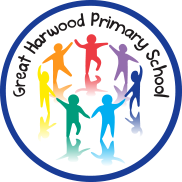Music
Intent
At Great Harwood Primary School we use the Kapow Primary Music scheme to help us deliver the requirements of the National Curriculum for music. Our intention is first and foremost to help children to feel that they are musical, and to develop a life-long love of music. We focus on developing the skills, knowledge and understanding that children need in order to become confident performers, composers, and listeners.
Our curriculum introduces children to music from all around the world and across generations, teaching children to respect and appreciate the music of all traditions and communities. Children will develop the musical skills of singing, playing tuned and untuned instruments, improvising and composing music, and listening and responding to music. They will develop an understanding of the history and cultural context of the music that they listen to and learn how music can be written down.
Through music, our curriculum helps children develop transferable skills such as team-working, leadership, creative thinking, problem-solving, decision-making, and presentation and performance skills. These skills are vital to children’s development as learners and have a wider application in their general lives outside and beyond school.
Implementation
Our music scheme of work takes a holistic approach to music, in which the individual strands below are woven together to create engaging and enriching learning experiences:
- Performing
- Listening
- Composing
- The history of music
- The inter-related dimensions of music
Each year group studies four units of music a year. Each five-lesson unit combines these strands within a cross- curricular topic designed to capture pupils’ imagination and encourage them to explore music enthusiastically. Over the course of the year, children will be taught how to sing fluently and expressively, and play tuned and untuned instruments accurately and with control.
They will learn to recognise and name the interrelated dimensions of music
- pitch, duration, tempo, timbre, structure, texture and dynamics - and use these expressively in their own improvisations and compositions. The units taught are mapped to the National Curriculum to show how they cover each of the national curriculum attainment targets as well as each of these strands within it.
A Progression of skills and knowledge document shows the skills that are taught within each year group and how these skills develop year on year to ensure attainment targets are securely met by the end of each key stage.
Our music curriculum follows the spiral curriculum model where previous skills and knowledge are returned to and built upon. Children progress in terms of tackling more complex tasks and doing more simple tasks better. They also develop understanding and knowledge of the history of music, staff and other musical notations, as well as the interrelated dimensions of music and more. In each lesson, pupils will actively participate in musical activities drawn from a range of styles and traditions, developing their musical skills and their understanding of how music works.
Lessons incorporate a range of teaching strategies from independent tasks, paired and group work as well as improvisation and teacher-led performances. Lessons are ‘hands-on’ and incorporate movement and dance elements, as well as making cross curricular links with other areas of learning. Lessons can be differentiated where necessary to ensure that lessons can be accessed by all pupils and opportunities to stretch pupils’ learning are available when required.
Knowledge organisers for each unit support pupils in building a foundation of factual knowledge by encouraging recall of key facts and vocabulary.
Music is not taught every week due to the constraints of time and the requirements of other subjects which need to be fitted into the timetable. It is taught in four blocks of five lessons across an academic year. A room in school is dedicated to music teaching and this is where all the instruments are stored. In this room there is also an interactive
whiteboard and laptop with external speakers so that children have opportunities to watch and listen to music, take part in online musical activities and use technology to create or respond to music.
Children have access to the following types of instruments:
Untuned percussion:
- Woodblocks
- Claves
- Two tone woodblocks
- Tulip woodblocks
- Guiros
- Maracas
- Castanets
- Triangles
- Finger cymbals
- Double agogos
- Sleigh bells
- Metal shakers
- Cabasa
- Cymbals
- Tambourines
- Hand drums
- Bongos
- Djembe
- Bodhrans
Tuned percussion:
- Chime bars
- Wooden alto chime bars
- Metal alto chime bars
- 13 note diatonic glockenspiels
- 25 note chromatic glockenspiels (a class set)
- Table top steel pan
Other instruments:
- Electronic keyboards
- Clarinets
- Ocarinas
There are several other ways in which musical ability and a love of music is fostered in school:
Each week one of our whole school assemblies is devoted to singing. Children are taught a range of songs in a variety of styles.
At various times of the year all children take part in school concerts and performances e.g. Christmas, the end of the school year or assemblies for parents. Children in key stage 2 are also given the opportunity to join the school choir which might perform at school events such as the summer fair or outside events such as the Great Harwood Christmas Light Switch On.
Children in year 4 take part in the Lancashire Let’s Sing programme. They work with external music teachers from Lancashire, as well as their class teacher, to learn songs or song parts and harmonies. They then have the opportunity to perform these in a public concert at a local theatre venue with several other schools from the area.
Great Harwood Primary School periodically holds a talent show where children are invited to showcase their musical talents if they wish to do so. This show is attended by parents and other relatives or friends.

